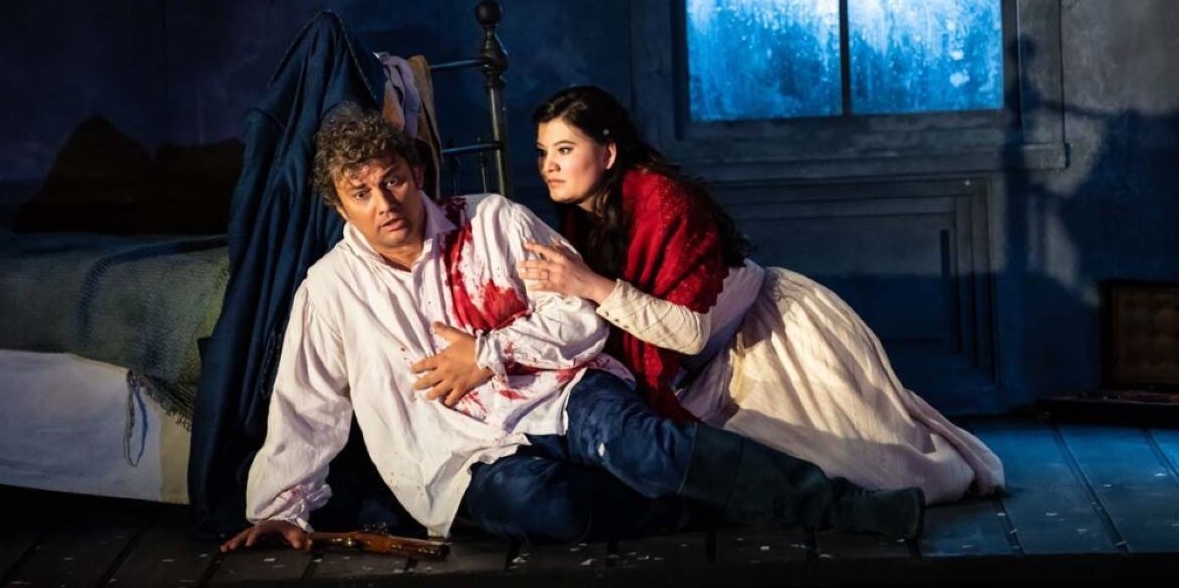Massenet’s Werther is based on Goethe’s epistolary novel, ‘The Sorrows of Young Werther’, published in 1774. Some, myself included, regard it as Massenet’s best opera. It has it all: passion, jealousy and tragedy. the music is more intensely dramatic than Manon and one has more sympathy for the characters.
The story is the epitome of Romanticism and is about 20-year-old Charlotte, who felt duty bound to look after her six siblings, and marry 25-year-old Albert, a successful businessman, as it was her mother’s dying wish. Her father, the Baille leaves her to it, preferring the lure of the tavern. Young Werther, a sensitive and passionate artist, falls hopelessly in love with her to no avail as she marries Albert and gives Werther no hope. Werther is distraught and kills himself with the pistols Albert sends him, knowing the result. Too late, as he is dying, Charlotte realises she loves Werther.
The novel was an instant success, and triggered ‘Werther fever’; young men dressed in blue frock-coats like Werther who shot themselves. The book was considered so dangerous that it was banned in Italy and Denmark.
This revival has refreshingly unfussy sets. The vast expanse of Act I, emphasise the isolation and loneliness of doomed Werther. Act IV is especially effective; it is snowing, and a small box at the back of the stage zooms to the front to reveal dying Werther.
As always, it is the singers that make the show. People come for star German tenor, Jonas Kaufmann, one of the highest paid opera singers today, as Werther. There was a time when he sung Werther all the time, everywhere, but not for eight years. He has been plagued with vocal problems since before Covid and forced to cancel multiple times. Those problems have not gone away. He dramatically drooped on a bench to hide a cough a few times; with credit to his professionalism and technique, the show went on, but at times he seemed to be marking his part because, especially in Acts 1 and 2, you could not hear him over the orchestra. His last words in Act I – ‘un autre son époux’ was sung with all the emotion and intensity of this horrific realisation. It was sung from the front of the stage, so there is no problem hearing him. He put everything he could into ‘pourquoi me reveiller’, where he showed stunning breath control, and he got through despite some strange vowels and bizarre falsetto, but nothing like as well as when he is on top form. What a relief for him to get to Act IV, when, dying, he can sing as restrained and quietly as he wishes, as there is little orchestral accompaniment.
Russian mezzo, Aigul Ackhmetshina stole the show. She was the youngest singer to join the ROH Jette Parker programme, and at 21 sang Carmen on the main stage. She has been hailed as the new Netrebko, and she is extraordinary. Last month she sang Elisabeth in Maria Stuarda in Amsterdam, a completely different voice type from Charlotte in Werther. She has an astoundingly rich, creamy and powerful voice, with a large vocal palette, completely overshadowing Kaufmann. Charlotte comes into her own in the long letter scene, culminating in the 2.5-minute aria ‘va, laisse couler mes larmes’. This is a perfect audition piece, because it is short, not technically difficult, but encompasses all the pent-up emotion, giving Charlotte the chance to deliver; Ackhmetshina delivers in spades. Recently heard here as Rosina, she will star in two new Carmen productions both here and at the Met. She had a tumultuous applause, and Kaufmann lifted her off her feet in recognition.
Welsh soprano Sarah Gilford was a 2021 Song Prize finalist in Cardiff, has a gorgeous voice and made the most of bubbly Sophie, Charlotte’s 15-year-old sister.
Canadian bass-baritone, Gordon Bintner, has a lovely warm sonorous tone and is a good-looking Albert, the horrid, boring husband who calmly sends Werther his pistols knowing he will kill himself.
Alistair Miles sings a sympathetic Bailli. James Cleverton and Christophe Mortagne were brilliant as the two old soaks, Johan and Schmidt; their French was excellent, I understood every word.
Antonio Pappano adds his sprinkle of magic to the emotional roller coaster of passion and desperation in Massenet’s terrific score. He will be badly missed when he leaves next year.
I highly recommend this heart-wrenching piece. With Kaufman on form, it would be a five-star must-see, but it is a must-see anyway for Ackhmetshina.

